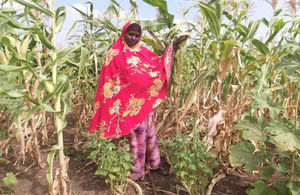DFID supporting women farmers in Lower Shabelle, Somalia
DFID supporting Somalia women farmers in Lower Shabelle

Orow standing in her maize and cow crop farm
Mareere is the small village in Awdhegle district, Lower Shabelle, in which there are about 125 households. Many of Mareere’s farmers are women with small farms, who turn to casual labour when their farms are not providing for them.
DFID’s Building Resilient Communities in Somalia programme, or BRCiS, found that most of the farming lands owned by these small scale farmers had been abandoned because of lack of access to advice and other resources, poor quality of farm tools and limited finance.
The BRCiS programme was initiated by DFID to help respond to these kinds of challenges. Through the development of a Community Based Disaster Management (CBDM) plan, DFID’s partner organisations are working with Awdhegle communities to help improve people’s resilience so that they were better prepared to cope in the face of conflict, economic crisis or environmental disaster like drought. The programme has begun to assist communities to bring back abandoned farm land into production and lift people out of casual labour.
One of the farmers supported by the BRCiS programme is Orow Aliow Isaq, a 37 year old widow and mother of 4 children: Abdullahi (8), Furqaan (6), Farhio (4) and Hassan (2). Orow owns one hectare of farm land which she inherited from her husband who passed away in 2012. Orow had not cultivated her piece of land since the death of her husband. This led her to turn to casual labour as a house help in order to support her children.
Through the BRCiS programme, Orow received support including 3 hours of tractor cultivation, 15kg of maize seed, 5kg of cowpea, a hoe and a shovel to enhance her farm’s production.
I thank DFID’s BRCiS initiative. Today I have cultivated my farm and entirely planted with two crops maize and cowpea and I expect a good harvest of the two crops in one season which has not been happening earlier. Normally, in the rainy season farmers harvest only maize crop, but thanks to BRCiS, we are now able to harvest more than one crop in a single rainy season”.
Although the maize crop has not yet been harvested, my children and I utilise cowpea which is an early maturing crop as well as some green maize, and this has increased our meal per-day from one to two. Thanks to Allah” concludes Orow.
In a period of crop failure or a lean season, poor farmers like Orow often borrow money from better-off people in the area. This sometimes results in them losing their few assets in the event they are unable to repay the money borrowed.
As a result of the BRCiS intervention, Orow and people like her are proud farmers. They are self- dependent, recovered from extreme hunger, and able to provide their children with more nutritious meals.
This approach balances the need for humanitarian assistance to respond to the impact of shocks, with the need to build long-term local capacity to deal with similar challenges in the future.
BRCiS Consortium consists of five international NGOs, all of which have extensive experience working in Somalia and a presence in the country. Concern Worldwide (CWW), Cooperazione e Sviluppo (Cesvi), International Rescue Committee (IRC), Norwegian Refugee Council (NRC – lead agency) and Save the Children International (SCI) are members of the consortium.